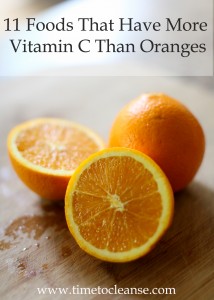 Can you think of a good source of vitamin C? An orange is probably the first thing that comes to mind… While eating oranges is a great way to obtain the vitamin C you need, there are foods that contain even more of this important vitamin. It’s wonderful that you can get all the benefits of vitamin C without eating oranges every day. Eating a wide variety of foods is important for optimum health. A varied diet allows you to obtain the many different nutrients your body requires. Besides, even tasty oranges can become boring after a while.
Can you think of a good source of vitamin C? An orange is probably the first thing that comes to mind… While eating oranges is a great way to obtain the vitamin C you need, there are foods that contain even more of this important vitamin. It’s wonderful that you can get all the benefits of vitamin C without eating oranges every day. Eating a wide variety of foods is important for optimum health. A varied diet allows you to obtain the many different nutrients your body requires. Besides, even tasty oranges can become boring after a while.
C-Lyte from Isagenix provides an easier and more convenient way to take your vitamin c, and contains the equivalent of 5 glasses of orange juice (but without the sugar!).
Benefits of Vitamin C
Vitamin C, also known as ascorbic acid, provides many health benefits. It’s an antioxidant, and our immune systems depend on it. Vitamin C is used to make collagen, the main component of connective tissue, and it plays an essential role in wound healing. It’s also used to produce some neurotransmitters, necessary for brain and nervous system function.
Quiz: Is Your Body TOXIC? Take the Test...
(get your free personalized report)
Some research suggests that vitamin C could protect against arthritis, high blood pressure, heart attack, stroke and some forms of cancer.
11 Healthy Foods with More Vitamin C than an Orange
The Recommended Dietary Allowance (RDA) for vitamin C is 75 milligrams a day for adult women, and 90 milligrams a day for adult men. One medium orange provides about 70 milligrams of vitamin C, or about 60 milligrams per 100 grams.
Here are 10 foods with even more vitamin C than that.
1. Kakadu Plum
With up to 5,320 milligrams of vitamin C for every 100 grams of edible fruit, the kakadu plum, native to Australia, has more vitamin C than any other fruit. Kakadu plums also contain the essential minerals iron, zinc, calcium and magnesium, and the antioxidants vitamin E, gallic acid and ellagic acid. Because of its high antioxidant content, kakadu plum extract is sometimes added to skincare products to prevent signs of skin aging.
Quiz: Is Your Body TOXIC? Take the Test...
(personalized report)
2. Camu Camu
The camu camu is a berry that grows in the Amazon rainforest. Its pulp contains 2,400 to 3,000 milligrams of vitamin C for every 100 grams. It is also high in antioxidants, including gallic acid, ellagic acid and flavonoids. Camu camu contains high levels of potassium.
3. Acerola
The acerola berry, also known as the West Indian cherry, contains about 1,680 milligrams of vitamin C per 100 grams of fruit. It also has flavonoids, vitamins A, B1, B2, iron, calcium, potassium, phosphorous, potassium and magnesium.
4. Sea Buckthorn
Sea buckthorn berries contain about 400 milligrams of vitamin C per 100 grams. They also contain other antioxidants: vitamin A, vitamin E and polyphenols. Sea buckthorn is a good source of omega-3, omega-6 and omega-7 fatty acids, folic acid and vitamins B1, B2 and K.
5. Guava
Raw guava contains about 125 milligrams of vitamin C per 100 grams of fruit. It’s also rich in fiber, vitamin A, folate and potassium.
6. Bell Peppers
When you’re making a salad, add some sweet bell peppers to boost your vitamin C intake. Yellow peppers contain about 185 milligrams of vitamin C per 100 grams; red peppers, about 130 milligrams per 100 grams; and green peppers, about 80 milligrams per 100 grams. Other nutrients include potassium, phosphorous, magnesium, folic acid and vitamins A, B1, B2, B3, B6 and K.
7. Chili Peppers
Spicy food can be healthy food. Raw green chili peppers contain about 245 milligrams of vitamin C per 100 grams, and raw red chili peppers have about 145 milligrams of vitamin C per 100 grams.
8. Kiwi Fruit
Kiwi fruit has about 165 milligrams of vitamin C per 100 grams of fruit. It also contains vitamin A, vitamin K, iron, potassium, phosphorous and folate. Kiwi fruit is fantastic for the digestive system. It has a very high fiber content and contains actinidin, an enzyme that aids protein digestion.
9. Lychee
With about 70 milligrams of vitamin C per 100 grams of fruit, this exotic fruit is a great vitamin C source. It also contains B vitamins, folate, potassium and copper, and is high in fiber.
10. Broccoli
When your mother said broccoli was good for you, she was right. Raw broccoli stalks contain about 90 milligrams of vitamin C per 100 grams. Broccoli also has Vitamin A, calcium and folate.
11. Brussels sprouts
Another green vegetable that mom was right about! Brussels sprouts contain about 85 milligrams of vitamin C for every 100 grams. They also contain vitamin A, many B vitamins, vitamin K, iron, potassium, phosphorous, calcium, copper and manganese, and are a good source of flavonoids.
Additional Sources:
Dietary Reference Intakes, Institute of Medicine
USDA National Nutrient Database
Vitamin C (Ascorbic Acid), University of Maryland Medical Center
Vitamin C Fact Sheet for Health Professionals, National Institutes of Health
